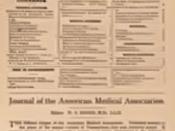Lamberg, Lynne. The Journal of the American Medical Association, Long Hours, Little Sleep: Bad Medicine for Physicians-in-Training? January 16, 2002-Vol. 287, No. 3 This article discusses the amount of time physicians-in-training work and sleep. A nationwide study has been proposed to test the impact that lack of sleep may have on the frequency and severity of medical errors. The hypothesis states that long hours of work and little sleep jeopardize both the physicians' health and the safety of their patients.
This study came about from previous studies being inconsistent with their findings. The previous studies have been flawed because of different definitions of 'rested.' This study aims to document actual hours of work and sleep by monitoring participants with "around-the-clock activity monitors," and "ambulatory digital sleep recorders." "Sleep debt" occurs when people consistently shortchange themselves on sleep and their sleepiness accumulates. Researchers stated that because a person gets a single night of "catch-up" sleep doesn't mean his or her debt is reversed.
People who aren't getting enough sleep might start tasks out well but their performance degrades when they must work fast. "Studies of fatigue's impact on medical trainees consistently show that sleep deprivation undermines mood." The article states that it is required for most physicians-in-training in the US to work 80 hours or more per week. "In some programs, resident physicians allegedly work more than 130 hours per week and are on call every second night." The intervention study proposes to examine the impact schedules have on physicians' performance.
Trainees are also at increased risk of motor vehicle crashes and traffic violations. One study found that early 1000 emergency medicine residents reported one or more near-crashes, and 8% of residents had been in 96 crashes, most of them occurring after a nightshift.
A conference was held in regards to the proposed study to outline necessary plans.
Conference speakers discussed current knowledge of sleep deprivation and how it affects performance, ways to curb fatigue, and a petition calling for establishment of national work-hour limits for resident physicians. Statistics addressed at this conference included one from the Institute of Medicine, it estimated that "medical errors cause more than 1 million injuries to patients in US hospitals each year and may trigger as many as 98,000 deaths annually." The only state that has resident work-hour regulations is New York. One of the problems in reporting over-worked residents is that no one wants to be the one to tell. New York provides for anonymous resident complaints about work-hour violations, and gives hospitals civil penalties for allowing excessive hours.
![[New York Bank Note Co. notice] (LOC)](https://s.writework.com/uploads/17/171683/new-york-bank-note-co-notice-loc-thumb.jpg)




